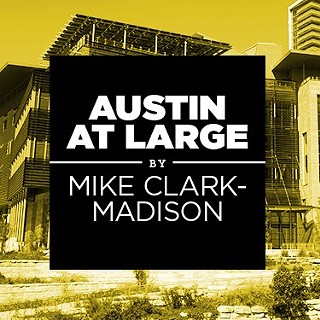Austin at Large: Digital Spills in the Silicon Hills
On Austin’s – and our own – awkward relationship with tech
By Mike Clark-Madison, Fri., Sept. 6, 2019
A week or so ago, a tweet from a fellow journalist brought to mind a familiar, old, sad, refrain: Why is the city of Austin's website so bad?
A few years back, when I chaired the city's Task Force on Community Engagement, we heard this question a lot; variations on the theme accounted for at least a third of the input we received, digested, and reported back to the City Council. It might be more succinct here to point to a few things people did like about the city's digital presence – some cool stuff made possible by the city's open data portals and some social initiatives that, as is true elsewhere, rose and fell with the talent and attention level of the folks at the controls.
But on the whole, the city's tech offerings got one-star reviews across the board – buggy, ugly, hard to navigate, hard to actually read, with search functions that are worse than useless. Doing business with the city online, or within the organization, was a crapshoot given the city's fragile tech capacity, despite broad interest and repeated promises to make government more efficient and responsive. (To illustrate, digital time sheets for city workers, first proposed ages ago and likely a fact of life in your workplace, are included in this year's budget as an "efficiency improvement" to help save money and get under the new state revenue cap.)
Don't You Know Where You Are?
The TFCE itself was charged to explore, and was presented with by the community, options for digital outreach – virtual town halls, real-time polling, crowdsourced data gathering, maps and visualizations, etc. – that the city could not even begin to develop or support, even though they weren't exactly futuristic. (The add-on engagement platform, branded as Speak Up Austin, was at that point a legacy product no longer supported by its third-party developer.)
The relevant city staffers made no pretense to the contrary; they gladly conceded these flaws, promised a reboot was in the offing, and looked the other way as departments threw up sites on Wix, created their own social media accounts, and asked for forgiveness later. The TFCE was formed in 2015, when this was already old news; as a journalist and a consultant, I'd heard (and made!) complaints about the city's online sloppiness since the 1990s.
From then to now, those complaints were followed promptly by an observation you may have made in your head reading this: This is Austin! This is our brand! How hard can this be? Even if you concede that in earlier days, Austin had to grapple with a bona fide digital divide, at this point even children and grandmothers, Eastside and Westside, have not just higher expectations as users but better skills as creators, coders, developers, and community managers. On any given weekend night Downtown (maybe just on Rainey or West Sixth) we could lasso enough talent to rebuild the city website the following weekend, once everyone sobered up. (On the margins, some city projects have taken the hackathon route and already done so.)
Our Culture and Our Expectations
Sure, after a week punctuated by yet another Second Amendment rampage on Texas soil (say it with me: r-e-d-f-l-a-g-l-a-w), yet another Worst Hurricane on Record, and what-the-hell-ever is going on in London, whining about the city of Austin's website is petty even if everyone else is doing it. (And sure, when you approach the civic-minded and ask, as the TFCE did, "Tell us how you really feel about the government!" you're going to get more salt than sugar.)
I know enough of the backstory to answer the initial question of why, or at least how, City Hall landed where it has technologically – big bureaucracy, silos, nobody talks to each other, public contracting is hard, key personnel have jumped ship, the usual. The more important question is: Why do we put up with this? Especially given that "we" the people of Austin include some of the best tech minds in the world? It's not like none of that talent has ever found its way into the city organization, or its cadre of consultants, or into the spaces (like the TFCE) where the city comes face-to-face with what is possible and what people want.
Why has so little changed for so long? I suppose it reflects the chronic, culturally reinforced low expectations we've been encouraged, particularly in Texas, to have for our government. Perhaps these are particularly low among the savvier demographics who would otherwise have higher standards – younger, richer in financial and human capital, less rooted in Austin, less engaged with civic life until they feel some urgency or necessity to demand change to systems (not just technological ones) they've become accustomed to working around instead.
And I also suppose it reflects a still palpable psychic distance between Austin's tech community and others in town. Even after 30-plus years of digitally driven growth, we haven't yet fully integrated innovation and tech fluency into our identity and civic DNA, into what it truly, obviously means to be an Austinite. Perhaps the deficits in the city's digital presence are the same ones we all need to fill as we continue to learn how best to use the assets we have to make this town work.
Got something to say? The Chronicle welcomes opinion pieces on any topic from the community. Submit yours now at austinchronicle.com/opinion.







